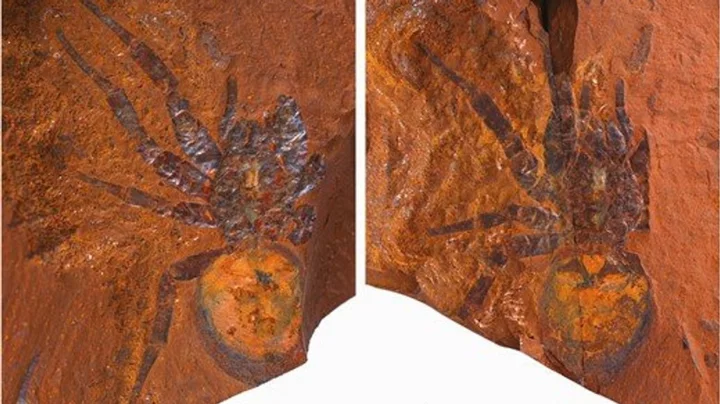
Scientists find 'giant' dinosaur spider fossil in Australia
If you thought Australia’s spiders were scary, wait until you see the prehistoric version. Scientists have found a fossilised giant trapdoor spider in New South Wales, only the fourth specimen of its kind to be found in Australia. The creature would have roamed and hunted in the surrounding areas which were once a lush rainforest, researchers said in a recently filed report. Last year, scientists unearthed fossils of the rainforest area from millions of years ago, teeming with specimens including plants, trapdoor spiders, giant cicadas and wasps. Now the area is a grassland region known as McGraths Flat. Researchers have named the spider fossil ‘Megamonodontium mccluskyi’. It would have lived in the Miocene period 11m to 16m years ago. “Only four spider fossils have ever been found throughout the whole continent, which has made it difficult for scientists to understand their evolutionary history,” said palaeontologist Matthew McCurry of the University of New South Wales and the Australian Museum. “That is why this discovery is so significant, it reveals new information about the extinction of spiders and fills a gap in our understanding of the past. “The closest living relative of this fossil now lives in wet forests in Singapore through to Papua New Guinea. “This suggests that the group once occupied similar environments in mainland Australia but have subsequently gone extinct as Australia became more arid.” The spider was found among many other Miocene fossils. In some of them, the fossils were so well preserved that subcellular structures could be made out. “Scanning electron microscopy allowed us to study minute details of the claws and setae on the spider's pedipalps, legs and the main body,” said virologist Michael Frese of the University of Canberra. The details meant scientists could confidently place it near the modern Monodontium, or trapdoor spider. However, it is five times larger than its modern day relatives. Megamonodontium mccluskyi's body is 23.31 millimetres long – that is just over an inch. The discovery of the species also tells us something of the past climate of Australia, the report added. The fact that it was found in a layer of rainforest sediment means the region was once much wetter than it is now. That could, in turn, help scientists understand how a warming climate has already altered the country’s life forms – and how it might change them again. "Not only is it the largest fossilized spider to be found in Australia but it is the first fossil of the family Barychelidae that has been found worldwide," said arachnologist Robert Raven of Queensland Museum. "There are around 300 species of brush-footed trapdoor spiders alive today, but they don't seem to become fossils very often. "This could be because they spend so much time inside burrows and so aren't in the right environment to be fossilized." The findings were published in the Zoological Journal of the Linnean Society. Sign up to our free Indy100 weekly newsletter Have your say in our news democracy. Click the upvote icon at the top of the page to help raise this article through the indy100 rankings.
2023-09-25 21:50
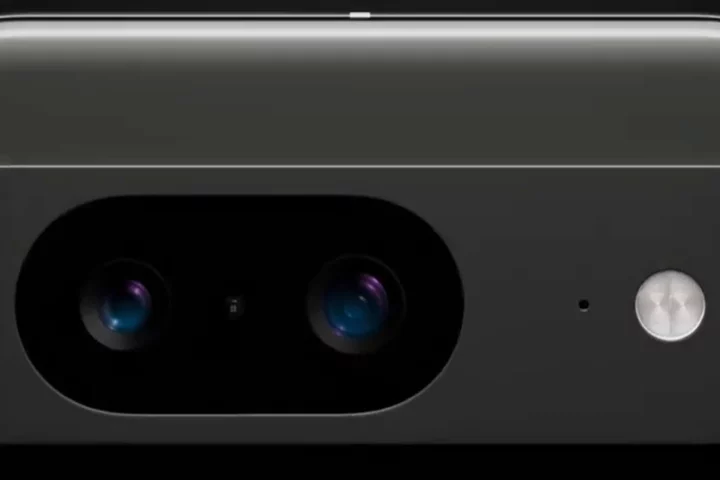
Google Pixel 8 camera will include ‘creepy’ face-changing AI
Google’s next flagship smartphone will feature an AI-powered camera that can automatically alter the expression on someone’s face, according to a leaked video. The Google Pixel 8 and Google Pixel 8 Pro, which are set to be unveiled on 4 October, have already been partially revealed by the US tech firm, which has a habit of teasing its devices before the official release date. The latest promo video, posted by reliable leaker Kamila Wojciechowska, shows Pixel 8 users radically adjusting the appearance of photo subjects “with a tap”. “Reimagine an image with Magic Editor from Google Photos,” the video states. “It’ll make you wonder, can a phone be made of magic? Nope, it’s AI.” The video generated excitement among Pixel owners on social media, though some expressed concern about the camera’s abilities. “I am sold on the Pixel 8 series,” one user of X, formerly Twitter, posted. “The head swap kinda creepy though.” Similar to Apple with its latest iPhone 15 series, the tech giant is expected to place a major emphasis on the phone’s camera, with other leaks and rumours surrounding Google’s next Pixel devices suggesting both versions will feature a 50 megapixel main camera, together with a 10.5 megapixel front camera. The Pixel 8 Pro will feature an additional rear camera that offers telephoto capabilities and 5x optical zoom. Key specs have also been leaked, most notably the inclusion of a Tensor G3 chipset that will enable better processing power. The price for the standard version is expected to be £699 in the UK and $699 in the US, while the premium version will cost £999 in the UK and $899 in the US. Anyone who pre-orders the Pixel 8 Pro will also receive a free Pixel Watch 2. Google does not comment on leaks or rumours about unreleased products. Read More 10 ways AI will change the world – from curing cancer to wiping out humanity Pixel 6 pre-order: How to get Google’s new phone Google Pixel 6 release date revealed for ‘iPhone killer’ Google Pixel buds A-series review: AirPods for the Android crowd
2023-09-25 21:31

Amazon invests $4 billion in Anthropic AI in exchange for minority stake and further AWS integration
Amazon said on Monday that it's investing $4 billion into the artificial intelligence company Anthropic in exchange for partial ownership and Anthropic's greater use of Amazon Web Services (AWS), the e-commerce giant's cloud computing platform.
2023-09-25 21:12

Indonesia may issue regulation on social media e-commerce this week -president
JAKARTA (Reuters) -Indonesia may issue on Tuesday a regulation on the use of social media to sell goods in the
2023-09-25 20:27
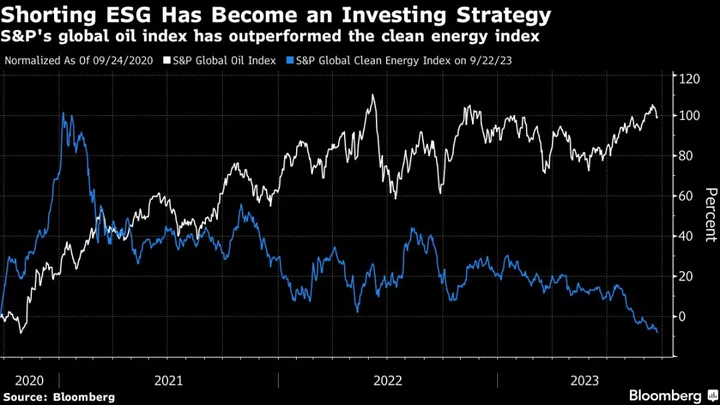
Short Sellers Mount Attack on ESG Stocks Bloated From Green Hype
Hedge fund managers are piling into short positions in ESG stocks as they hunt for bogus green claims
2023-09-25 20:00
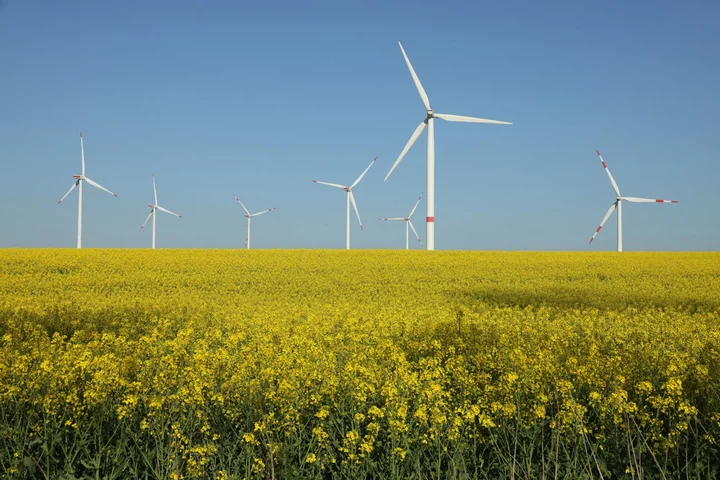
Wind Power Package for Europe to be Presented in October
The European Union is planning to unveil measures to help its ailing wind sector next month, after supply-chain
2023-09-25 19:44

Tesla unveils new yoga-practicing robot
Tesla has unveiled the latest version of its humanoid robot, demonstrating its ability to adapt to its environment and even perform yoga poses. It is significant progress for the Optimus bot, which was unable to walk unassisted just one year ago. “Optimus is now capable of self-calibrating its arms and legs,” stated a video showing off the robot. “Accurately calibrated, Optimus learns various tasks more efficiently... For example, it can now sort blocks by colour fully autonomously. And it does so while dealing with the dynamic reality of our world.” Tesla CEO Elon Musk shared the video on X, formerly known as Twitter, with the caption “progress”. Mr Musk has previously said that Tesla’s humanoid robot has the potential to be “more significant” than the company’s car business. It is being developed to replace low-skilled labour, with its humanoid form designed to allow it to carry out human tasks, ranging from shopping in a supermarket to working on factory production lines. “Essentially in the future, physical work will be a choice,” Mr Musk said when the robot was first announced in 2021. “It has profound implications for the economy, given that the economy at its foundational level is labour.” New details from the tech billionaire’s authorised biography also revealed that he told employees that Optimus was the key to turning Tesla into a $10 trillion company. Tesla is yet to give any information about Optimus’s price or release date, though early versions are expected to be tested on the company’s vehicle production line. At last year’s Tesla AI Day, Mr Musk said deliveries could take place within three-to-five years, though his estimates are typically overly ambitious. Tesla is also currently undertaking a recruitment drive to help speed up the development of Optimus, with more than 50 positions listed on its website relating to robotics. Read More Elon Musk and the one trillion-dollar algorithm that explains everything he does Elon Musk warns of ‘civilisational risk’ posed by AI at historic gathering Cybertruck sparked secret Tesla revolt, Elon Musk biography reveals Volcano discovery could power electric cars for decades, scientists say
2023-09-25 18:51
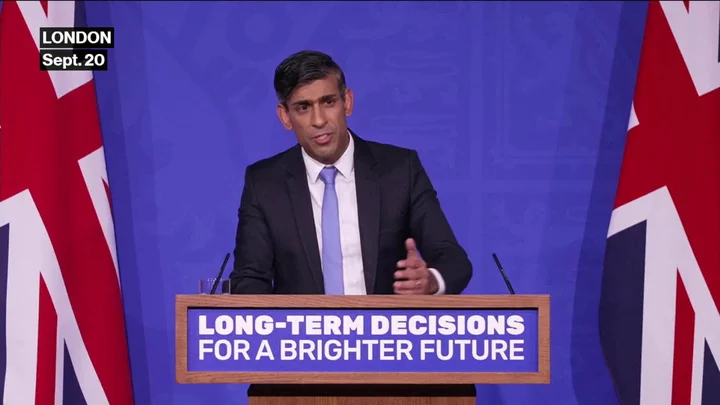
Fund Managers in ‘Complete Shock’ After Sunak’s Green Pivot
Some of the world’s biggest green investors are voicing dismay and bewilderment as they struggle to digest the
2023-09-25 18:37

EU Set to Propose Rules to Allow Germany E-Fuels for Cars
Germany has led a monthslong crusade to extend the use of internal combustion engines under the European Union’s
2023-09-25 18:26

DHL, Sasol Agree to Produce Sustainable Aviation Fuel in Germany
DHL Group, Sasol Ltd. and HH2E AG agreed to collaborate on producing sustainable, hydrogen-based aviation fuels in Germany
2023-09-25 17:38

People don’t become adults till they’re in their 30s, research suggests
Ever felt a bit immature? Well, don't worry. People don't become fully "adult" until they're in their 30s, according to experts. While, in the UK, we legally become adults at 18, research suggests people in their late teens are still going through significant changes in the brain. Professor Peter Jones, from Cambridge University, told the BBC back in 2019: "What we're really saying is that to have a definition of when you move from childhood to adulthood looks increasingly absurd. "It's a much more nuanced transition that takes place over three decades." He added: "I guess systems like the education system, the health system and the legal system make it convenient for themselves by having definitions." When you reach 18, you can vote, buy alcohol, get a mortgage and are also treated as an adult if you get in trouble with the police. Despite this, Professor Jones says he believes experienced criminal judges recognise the difference between a 19-year-old defendant and a "hardened criminal" in their late 30s. "I think the system is adapting to what's hiding in plain sight, that people don't like (the idea of) a caterpillar turning into a butterfly," he said. "There isn't a childhood and then an adulthood. People are on a pathway, they're on a trajectory." Meanwhile, in an interview with PBS, Dr Jay Giedd, chair of child psychiatry at Rady Children’s Hospital-San Diego, said that the development of the prefrontal cortex, the part of the brain responsible for social interactions, regulating emotions, controlling impulsive behaviour, and assessing risk, doesn’t stop at age 18. Instead, he said it takes almost 25 years. So give yourself a break unless you are in your 30s. And if you are? Grow up. Sign up to our free Indy100 weekly newsletter Have your say in our news democracy. Click the upvote icon at the top of the page to help raise this article through the indy100 rankings.
2023-09-25 17:25

OpenAI CEO says possible to get regulation wrong, but should not fear it
TAIPEI The CEO of ChatGPT maker OpenAI said on Monday that it was possible to get regulation wrong
2023-09-25 16:29
You Might Like...

India Prefers Negotiating With EU on Carbon Tax to WTO Complaint
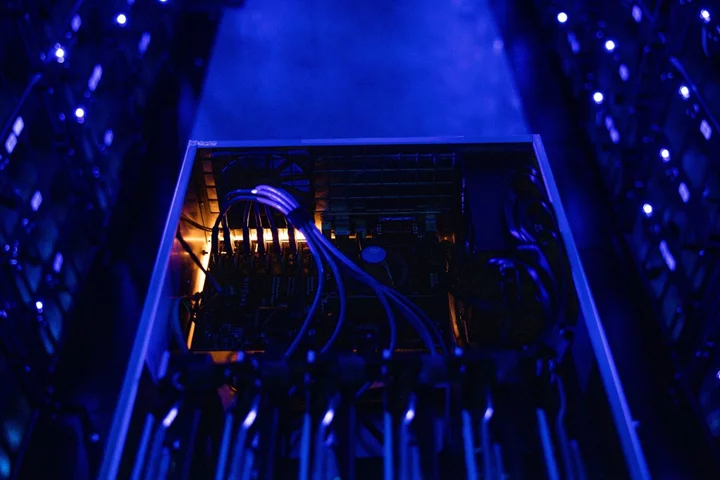
Bitcoin Miner Marathon’s Quarterly Loss Narrows, Revenue Jumps
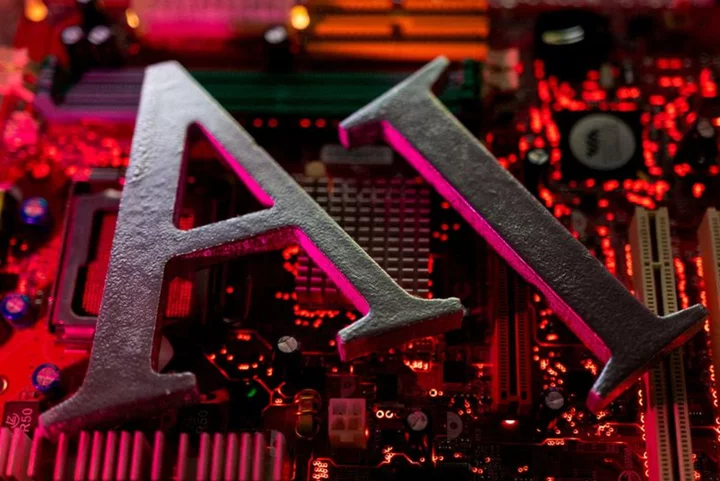
Exclusive-Germany, France and Italy reach agreement on future AI regulation

Intel Labs Introduces AI Diffusion Model, Generates 360-Degree Images from Text Prompts

Qarar and Biz2X Partner to Launch the First Cloud-Based SME Lending Platform in Saudi Arabia

Cyberattack forces Idaho hospital to send ambulances elsewhere

The largest newspaper publisher in the US sues Google, alleging online ad monopoly
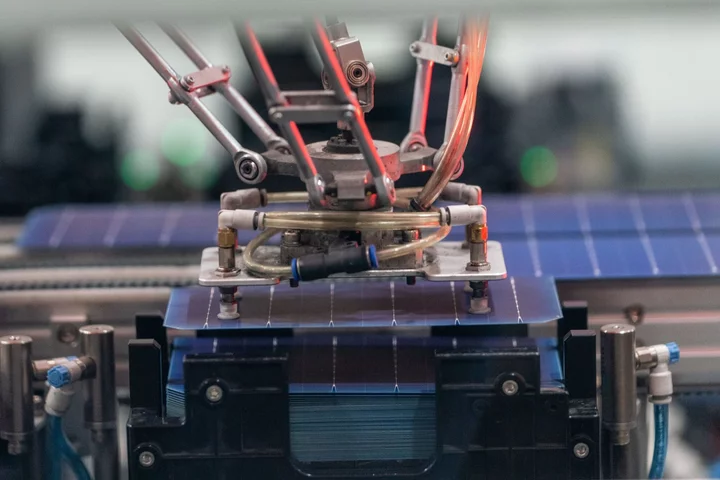
Solar Manufacturing in the US Is Facing a Bleak Future, Analysts Warn
